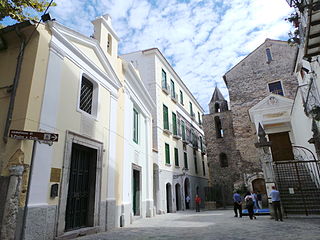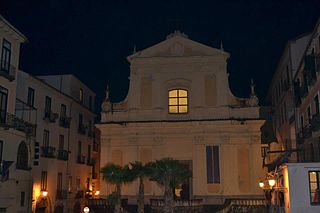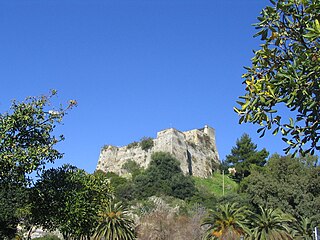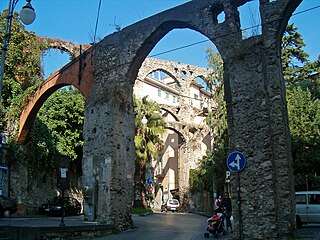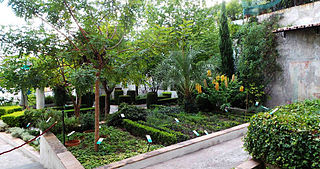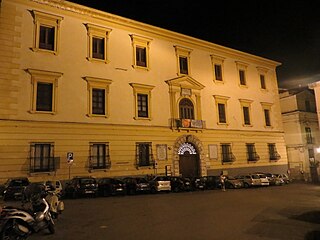8 Sights in Salerno, Italy (with Map and Images)
Legend
Premium Sights
Book tickets, guided tours and activities in Salerno.
Guided Free Walking Tours
Book free guided walking tours in Salerno.
Welcome to your journey through the most beautiful sights in Salerno, Italy! Whether you want to discover the city's historical treasures or experience its modern highlights, you'll find everything your heart desires here. Be inspired by our selection and plan your unforgettable adventure in Salerno. Dive into the diversity of this fascinating city and discover everything it has to offer.
Sightseeing Tours in SalernoActivities in Salerno1. San Pietro a Corte
The archaeological complex of San Pietro a Corte is an area in the historic center of Salerno where the archaeological evidence of the various historical changes starting from the first century AD is documented and visible. The entrance is on Larghetto San Pietro a Corte.
Wikipedia: Complesso archeologico di San Pietro a Corte (IT)
2. Complesso Monumentale di Santa Sofia
The monumental complex of Santa Sofia, located in Salerno in Piazza Abate Conforti, was built at the end of the tenth century as the first monastery of the Benedictine Order dedicated to Santa Sofia, from which it takes its name. The former church of Santa Sofia, also known as the church of the Santissima Addolorata, is part of it.
Wikipedia: Complesso monumentale di Santa Sofia (Salerno) (IT)
3. Museo virtuale della scuola medica salernitana
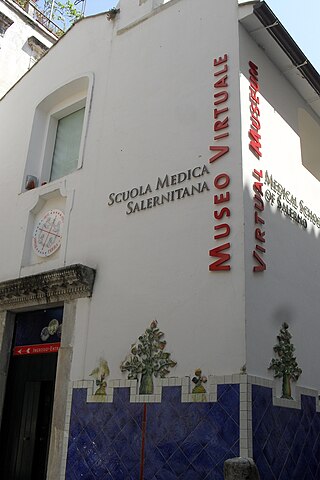
The Virtual Museum of the Salerno Medical School is located in Via dei Mercanti 74, the ancient commercial artery of the historic center of Salerno, not far from the Duomo. Inaugurated in 2009, it replaces the old Didactic Museum of the Salerno Medical School with a complete restoration not only of the structure, but of the entire museum organization.
Wikipedia: Museo virtuale della scuola medica salernitana (IT), Website
4. Forte La Carnale
The La Carnale Fort of Salerno is a cavalry tower built on the coast, near the mouth of the Irno river. This stronghold was part of a defense system that was built starting in 1563 in order to defend the city from fierce Saracen raids.
5. Acquedotto medievale di Salerno
The medieval aqueduct of Salerno was erected in the ninth century to supply water to the monastery of San Benedetto, near the eastern walls. It is located in the historic center of Salerno, under the Bonadies hill and its castle of Arechi.
6. Museo Roberto Papi
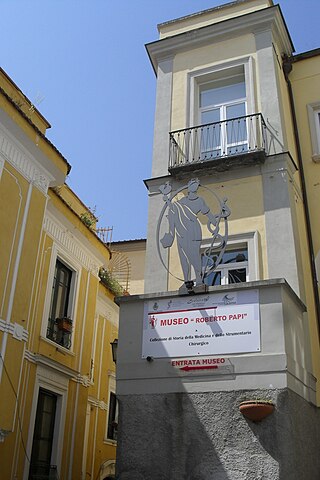
The Roberto Papi Museum is located in the historic Palazzo Galdieri in Salerno. Established in September 2009, it collects an important collection of medical-surgical instruments collected by Mario Papi. The museum is dedicated to Roberto Papi who died prematurely and to whom the museum is named.
7. Giardino della Minerva
Minerva's Garden is located in the heart of the old town of Salerno, in a zone known as the "Plaium montis" in the Middle Ages. It is halfway along an ideal route that runs along the axis of the walled and terraced vegetable gardens, climbing from the Municipal Park, near the river Fusandola, towards the Arechi Castle.
8. Museo Diocesano San Matteo
The San Matteo Diocesan Museum of Salerno is located in the building of the archiepiscopal seminary which was, previously, the last seat of the Salerno medical school and is an important reference point for the knowledge of the history and culture of Campania from the Middle Ages to the eighteenth century.
Share
How likely are you to recommend us?
Disclaimer Please be aware of your surroundings and do not enter private property. We are not liable for any damages that occur during the tours.
